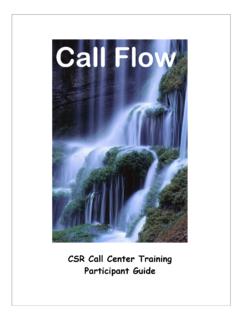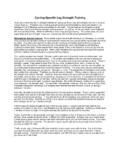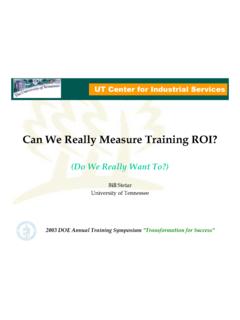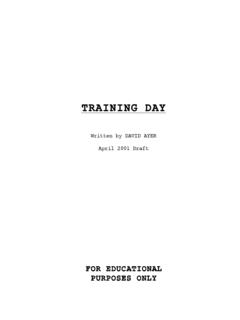Transcription of db 27 a,b&c 00 - PBworks
1 Chapter published in Foley, G. (Ed.). Understanding Adult Education and Training. Second Edition. Sydney: Allen & Unwin, 225-239. EXPERIENCE-BASED LEARNING. Lee Andresen, David Boud and Ruth Cohen EXPERIENCE-BASED LEARNING: CONTEMPORARY ISSUES. The distinguishing feature of experience-based learning (or experiential learning1) is that the experience of the learner occupies central place in all considerations of teaching and learning. This experience may comprise earlier events in the life of the learner, current life events, or those arising from the learner's participation in activities implemented by teachers and facilitators. A key element of experience-based learning (henceforth referred to as EBL) is that learners analyse their experience by reflecting, evaluating and reconstructing it (sometimes individually, sometimes collectively, sometimes both) in order to draw meaning from it in the light of prior experience.
2 This review of their experience may lead to further action. All learning necessarily involves experience of some sort, prior and/or current. However, scrutiny of many contemporary teaching and training practices might lead one to think otherwise. Much of the impetus for EBL has been a reaction against an approach to learning which is overly didactic, teacher controlled and involving a discipline-constrained transmission of knowledge. It supports a more participative, learner-centred approach, which places an emphasis on direct engagement, rich learning events and the construction of meaning by learners. EBL is of particular interest to adult educators because it encompasses formal learning, informal learning, non-formal learning, lifelong learning, incidental learning and workplace learning. EBL is based on a set of assumptions about learning from experience. These have been identified by Boud, Cohen and Walker (1993) as: experience is the foundation of, and the stimulus for, learning learners actively construct their own experience learning is a holistic process learning is socially and culturally constructed learning is influenced by the socio-emotional context in which it occurs.
3 THE DEFINING CHARACTERISTICS OF EXPERIENCE-BASED LEARNING. EBL does not lend itself to being reduced to a set of strategies, methods, formulas or recipes. It is possible, however, to recognise within it some features which characterise and distinguish it from other approaches: i. EBL appears to demand that three factors each be operating, at some level. These are: Involvement of the whole person intellect, feelings and senses. For example, In learning through role-plays and games, the process of playing or acting in these typically involves the intellect, some or other of the senses and a variety of feelings. Learning takes place through all of these. ii. Recognition and active use of all the learner's relevant life experiences and learning experiences. Where new learning can be related to personal experiences, the meaning thus derived is likely to be more effectively integrated into the learner's values and understanding.
4 Iii. Continued reflection upon earlier experiences in order to add to and transform them into deeper understanding. This process lasts as long as the learner lives and has access to memory. The quality of reflective thought brought by the learner is of greater significance to the eventual learning outcomes than the nature of the experience itself. `Learning is the process whereby knowledge is created through the transformation of experience.' (Kolb 1984:38). However, EBL varies in practice according to three possibilities which represent factors that may or not be applicable in a particular instance. These are: iv. Intentionality of design. Deliberately designed learning events are often referred to as `structured' activities and include simulations, games, role play, visualisations, focus group discussions, sociodrama and hypotheticals. v. Facilitation. This is the involvement of some other person(s) (teachers, leaders, coaches, therapists).
5 When such persons are involved, the outcomes may be influenced by the degree of skill with which they operate. EBL often assumes relatively equal relationships between facilitator and learner, involves the possibility of negotiation, and gives the learner considerable control and autonomy. vi. Assessment of learning outcomes; and in the event that assessment takes place, much depends upon by what means, by whom, and for what purpose it is carried out. EBL is often as much concerned with the process as the outcomes of learning, and assessment procedures should accord with this. Assessment tasks congruent with EBL include individual or group projects, critical essays located in the learner's own experience, reading logs, learning journals, negotiated learning contracts, peer assessment and self-assessment. They might include a range of presentation modes other than writing, so as to enable the holism, context and complexity of the learning to be evidenced.
6 ESSENTIAL CRITERIA FOR EXPERIENCE-BASED LEARNING. EBL is not limited to being a mere `method' or `technique' or even a particular `approach'; it is as wide and deep as education itself. Although there is no single way to identify the process of EBL, there are some criteria which need to be fulfilled if teaching and learning activities are to be labelled `experience-based'. The most important criterion we start with refers to the `ends' of education its goals, its purposes, what it is trying to achieve. We follow that with a number of criteria that refer to the `means' of education how we go about doing things to try to achieve those goals or ends. First, the end .. The ultimate goal of EBL involves learners' own appropriation of something that is to them personally significant or meaningful (sometimes spoken of in terms of the learning being `true to the lived experience of learners').
7 2. Next, the means .. EBL has a primary focus on the nature of learners' personal engagement with phenomena (sometimes described as being more or less directly in touch with the realities being studied). Debriefing and reflective thought are employed as essential stages. (experience alone is not necessarily educative). There is acknowledgment of the premise that learning invariably involves the whole person (senses and feelings as well as intellect; affect and conation as well as cognition); and that this is associated with perceptions, awareness, sensibilities and values being invoked, representing the full range of attributes of the functioning human being. There is recognition of what learners bring to the learning process (informal or formal recognition of prior learning). There is a particular ethical stance typically adopted towards learners by those who are their teachers, trainers, leaders or facilitators (involving features such as respect, validation, trust, openness and concern for the well-being of the learner, and both valuing and pursuing the self-directive potential of the learner).
8 It is our view that all these criteria are probably conjointly necessary before an educational event becomes properly called an experiential learning activity. HISTORICAL ROOTS OF EXPERIENCE-BASED LEARNING. The history of learning through experience follows the history of epistemology itself - the search for the basis of true knowledge. The terms experience and experiment are etymologically one. 2 In ancient Greek times Aristotle attacked the influential notion Plato had earlier advocated about the value of truth achieved by pure thought alone, uncontaminated by the world. Aristotle (in McKeon 1948:689 690). argued instead that: All .. by nature desire to know. An indication of this is the delight we take in our senses; for even apart from their usefulness they are beloved for themselves .. With a view to action, experience seems in no respect inferior to art, and men of experience succeed even better than those who have theory without experience.
9 In the seventeenth century the English philosopher John Locke adopted a similar position. He asked the question, `Whence has it all the materials of reason and knowledge?' to which he answered: .. in one word, from experience. In that all our knowledge is founded, and from that it ultimately derives itself .. Experience here must teach me what reason cannot. (Locke in Woozely 1964:89, 339). In the nineteenth century, John Stuart Mill wrote of the distinction between formal instruction and self-education, and stressed the virtues of learning a foreign language by living in the country where it is spoken rather than by studying it from books (Houle 1976:27). 3. CONTEMPORARY INFLUENCES ON EXPERIENCE-BASED LEARNING. One of this century's most influential educational thinkers, John Dewey, took up the same theme when he wrote: I assume that amid all uncertainties there is one permanent frame of reference: namely the organic connection between education and personal experience.
10 (Dewey 1939:25). Dewey continued this argument with `all genuine education comes about through experience [but] .. not all experiences are genuinely or equally educative'. Current thinking might amplify this and suggest that the learning is likely to be recognised and applied only in so far as the learner actively reflects upon the experience. Over this century the experiential learning movement has evolved in an eclectic fashion, making its presence felt at all levels of education. Montessori, Hahn and Neill are all remembered as educators of children, but they have nonetheless greatly influenced our understanding of EBL for adults. The Italian educator Maria Montessori's work can be understood as what we today call EBL. Her method involved imposing nothing but creating an environment in which children learn to think by themselves, through the progressive mastery of their first-hand experiences (Kraft :10).

![This is [Synora Jones] from CMS and myself and [Kellie ...](/cache/preview/4/b/b/1/7/0/a/0/thumb-4bb170a060e61e8f21cf44a3419a7374.jpg)





